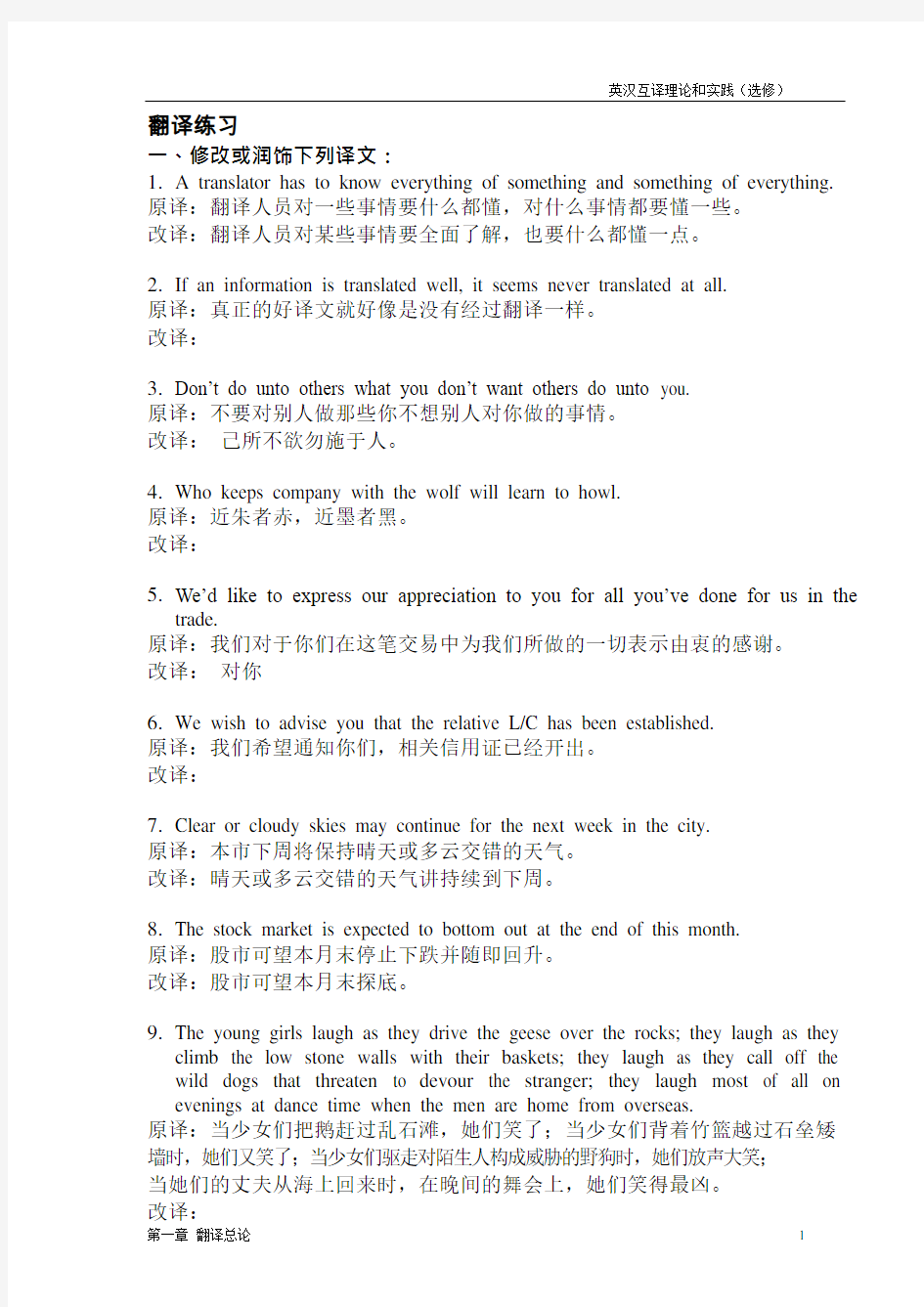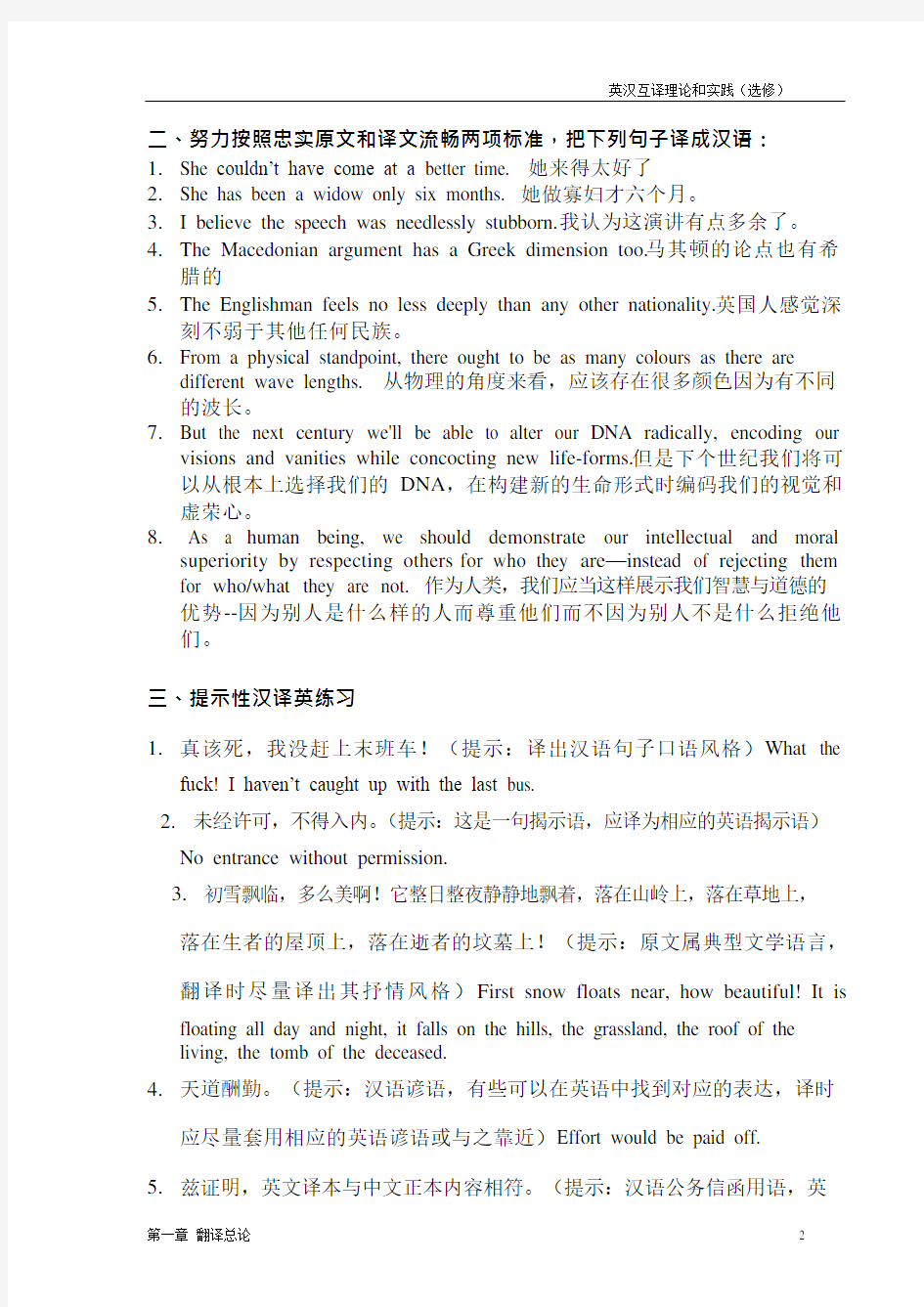翻译练习(可编辑修改word版)


翻译练习
一、修改或润饰下列译文:
1. A translator has to know everything of something and something of everything. 原译:翻译人员对一些事情要什么都懂,对什么事情都要懂一些。
改译:翻译人员对某些事情要全面了解,也要什么都懂一点。
2.If an information is translated well, it seems never translated at all.
原译:真正的好译文就好像是没有经过翻译一样。
改译:
3.Don’t do unto others what you don’t want others do unto you.
原译:不要对别人做那些你不想别人对你做的事情。
改译:己所不欲勿施于人。
4.Who keeps company with the wolf will learn to howl.
原译:近朱者赤,近墨者黑。
改译:
5.We’d like to express our appreciation to you for all you’ve done for us in the
trade.
原译:我们对于你们在这笔交易中为我们所做的一切表示由衷的感谢。
改译:对你
6.We wish to advise you that the relative L/C has been established.
原译:我们希望通知你们,相关信用证已经开出。
改译:
7.Clear or cloudy skies may continue for the next week in the city.
原译:本市下周将保持晴天或多云交错的天气。
改译:晴天或多云交错的天气讲持续到下周。
8.The stock market is expected to bottom out at the end of this month.
原译:股市可望本月末停止下跌并随即回升。
改译:股市可望本月末探底。
9.The young girls laugh as they drive the geese over the rocks; they laugh as they
climb the low stone walls with their baskets; they laugh as they call off the wild dogs that threaten to devour the stranger; they laugh most of all on evenings at dance time when the men are home from overseas.
原译:当少女们把鹅赶过乱石滩,她们笑了;当少女们背着竹篮越过石垒矮墙时,她们又笑了;当少女们驱走对陌生人构成威胁的野狗时,她们放声大笑;
当她们的丈夫从海上回来时,在晚间的舞会上,她们笑得最凶。
改译:
二、努力按照忠实原文和译文流畅两项标准,把下列句子译成汉语:
1.She couldn’t have come at a better time. 她来得太好了
2.She has been a widow only six months. 她做寡妇才六个月。
3.I believe the speech was needlessly stubborn.我认为这演讲有点多余了。
4.The Macedonian argument has a Greek dimension too.马其顿的论点也有希
腊的
5.The Englishman feels no less deeply than any other nationality.英国人感觉深
刻不弱于其他任何民族。
6.From a physical standpoint, there ought to be as many colours as there are
different wave lengths. 从物理的角度来看,应该存在很多颜色因为有不同的波长。
7.But the next century we'll be able to alter our DNA radically, encoding our
visions and vanities while concocting new life-forms.但是下个世纪我们将可以从根本上选择我们的DNA,在构建新的生命形式时编码我们的视觉和虚荣心。
8.As a human being, we should demonstrate our intellectual and moral
superiority by respecting others for who they are—instead of rejecting them for who/what they are not. 作为人类,我们应当这样展示我们智慧与道德的优势--因为别人是什么样的人而尊重他们而不因为别人不是什么拒绝他们。
三、提示性汉译英练习
1.真该死,我没赶上末班车!(提示:译出汉语句子口语风格)What the
fuck! I haven’t caught up with the last bus.
2.未经许可,不得入内。(提示:这是一句揭示语,应译为相应的英语揭示语)
No entrance without permission.
3.初雪飘临,多么美啊!它整日整夜静静地飘着,落在山岭上,落在草地上,
落在生者的屋顶上,落在逝者的坟墓上!(提示:原文属典型文学语言,翻译时尽量译出其抒情风格)F irst snow floats near, how beautiful! It is floating all day and night, it falls on the hills, the grassland, the roof of the
living, the tomb of the deceased.
4.天道酬勤。(提示:汉语谚语,有些可以在英语中找到对应的表达,译时
应尽量套用相应的英语谚语或与之靠近)Effort would be paid off.
5.兹证明,英文译本与中文正本内容相符。(提示:汉语公务信函用语,英
译应体现出汉语公务信函语体特征)Here we prove that , the English translation corresponds with the Chinese original.
第三节翻译的过程
彭卓吾先生说:“搞翻译,既要钻进去,又要跳出来;钻进去以求理解,跳出来以求表达。”
翻译三步曲:
a)第一步:正确理解(comprehension)
b)第二步:充分表达(expression)
c)第三步:认真校对(proofreading)
I.第一步:正确理解
著名翻译理论家谭载喜先生非常重视语义对翻译理解过程的作用,他在《翻译学与语义》中提到:
‘意思’是翻译中必须处理的核心问题。译者要做出一篇与原文功能对等的译文,就必须在意思的理解和表达上做文章。他不仅要懂得原文的意思,而且要懂得译文读者可能怎样去理解传译过来的意思。用美国著名翻译理论家奈达的观点说,就是要懂得怎样才能保证读者‘对译文不会产生误解’。
例1
原文:Now that O’Neal has helped the Lakers to a second straight NBA championship, I’m sure the question will be modified to ask where he ranks among the all-time big men.
译文:现在奥尼尔已经帮助湖人拿到了一个二连冠。我确信问题要改了,关于他在史上的大个子中的排名了。
原文:The question before the house is one of awful moments to our country.
译文:众议院讨论问题对我们国家是一个糟糕的时候
例3
原文:The nursing of the sick, said Florence Nightingale, is a vocation as well as a profession.
译文:弗罗伦斯.南丁格尔说,对病人的护理是一种专业时又是一种职业。例4
原文:He raised the old man’s head a trifle along with the pillow on which it rested…
译文:他把一个玩意和老人休息时的枕头放在一起
汉译英时要善于仔细地、深入地、准确地理解中文原文的意思。这是因为准确的理解是做好翻译的前提。
例5
原文:He said that he had spent two hours in repairing the outer man, and hinted that he should like to refresh the inner man.
译文:他说他已经花了两个小时修复人的外表,暗示他想更新人的灵魂。例6
原文:The boss’s girl Friday called me.
原译:老板的女儿弗蕾蒂打电话给我。
改译:老板的女儿弗蕾蒂打过电话给我。
原文:我们常用“摸着石头过河”这个俗语来形容我国的改革开放事业是没有先例。
译文:Since there is no previous experience to fall back on, we have to “wade across the stream by feeling the way,” as we say in Chinese.
那么“摸着石头过河”应如何翻译成英语呢?有的人把它按字面翻译为crossing the river by feeling the stones。翻译的人根本就没有去认真地理解“摸着石头过河”是什么意思,应该怎样表达才能让外国人能够理解。正确的做法应该是按照下面的步骤去做: 1.“摸着石头过河”的字面意思如何理解?
2.它有什么暗含或延伸的意思?
3.英语里有没有相同或类似的说法?如果有,就可以直接借用;如果没有,是进行直译还是意译?
4.如果直译为crossing the river by feeling the stones 是否能被外国人理解?
5.过河是乘船过(crossing by boat)还是淌水过(wading across),动词用什么形式?
6.这里的河是大河、中河还是小河(river, stream, brook, etc.)?
7.摸的方式是用手摸还是用脚触?
8.石头是大石头还是小石头(rock, stone, pebble, etc.)?
9.如果意译为learning by experiment / by trial and error 是否可取?
10.直译和意译相结合wading across the stream by feeling the way 如何?
词的特性
词包括两层意义:概念意义(表层:denotation)和联想意义(深层:Connotation)。一个词如果离开了语境而独立存在时语义是游移不定的,是不可译的,要根据具体的语言环境和搭配习惯确定和选择词义,然后才能进行不同翻译搭配,确定译文。
例8
“develop”
1.Fresh air and exercise develop healthy bodies.
2.Richard Lewis at the University of California developed a safer form of the
drug. It can be put directly into eye.
3.In the wild, some animals have developed partnerships to help in the struggle
for survival.
4.In its broadest sense, education refers to any process by which an individual
gains knowledge or develops skills.
5.Early humans developed a way to use the moon’s changing faces to tell time.
6.Thomas Edison developed the telephone invented by Bell, an American.
7.To develop the students’ ability to undertake the experimental procedure is one
of the important tasks of teachers.
例9
“搞”
它在英语中没有准确的对应词。在翻译时要根据上下文转换视点,不要把注意力局限在“搞”上,要注意上下文中与“搞”有关的其他句子成分上。1)他一心要把对手搞臭。
2)把你的鞋子上的泥巴搞掉。
3)把这堆垃圾搞掉。
4)把某人搞掉。
5)此人专会在暗中搞鬼。
6)你到底搞什么鬼。
7)搞好与邻居的关系。
8)搞好救灾工作。
9)这件事只能搞好,不能搞坏。
10)这兄弟俩看起来很像,别把他们搞错了。
11)搞活企业。
12)实行对外开放,对内搞活的政策。
13)大量的作业搞得我头昏脑涨。
14)他是搞法律的。
15)我们搞一点核武器完全为了自卫。
II.充分表达
紧紧抓住文章的逻辑关系,透过语言的表层现象,深入到文章的深层结构,找出中心信息和外围信息。组织译文的结构,根据各层意思选择句子结构,搭起基本框架;根据上下文选择适当的词汇和表达手段,特别要按英语的表达逻辑来调整语句。如“虽然…但是”,在译成英文时不能译成Although…but…,如翻译“他虽穷却能知足常乐。”要译成Although he is poor, he is well contented."
例10
原文:That’s more than I can tell you.
译文:不是我不愿意告诉你,而是我现在不能告诉你。
例11
原文:When you jump at random, you can end inside a star.
译文:当你任意“穿越”的时候,可能会钻入一颗恒星里,化为灰烬。
?直译和意译
首先应当指出,直译不是死译,而是指基本保留原有句子结构,照字面意思翻译。意译也不是胡译、乱译,而是在不损害原文内容和精神的前提下,为了表达的需要,对原文作相应的调整,改变表达形式。在任何成功的译作中,我们可以发现直译和意译如水乳交融。
直译以严格意义上的忠实为宗旨,意译则更多考虑英语的特点,更强调译文的效果,不求形式对应,只求语言在深层次中的对应。总之,选择直译还是意译,应该根据文章具体需要而定,两种译法可以并用。
1.必须直译
例12
原文:虽然一篇译文可以像新瓶中的老酒,或似身着男装的女子,但是,酒仍不失其甘醇,女子不失其风韵。(提示:注意译出汉语句中的比喻辞格)译文:Although a translation may like old wine of a new bottle, or a lady dressed in male clothes, wine doesn’t lose its deg, lady doesn’t lose her charm.
2.必须意译
例13
原文:It is a long lane that has no turning.
直译:那是一条没有拐弯的长巷。
意译:无论多长的巷子也有拐弯之处。(路必有弯,事必有变。)
3.直译和意译均可
例14
原文:A brewer’s wife may drink of a tun.
直译:酿酒人的妻子不愁酒。
意译:自己动手,丰衣足食。
原文:He had one foot in the grave.
直译:他的一只脚踏进了坟墓,离死不远了。
意译:将死之躯。
原文:He was only a cock of the dunghill.
直译:他不过是只在自家粪丘上啼叫的公鸡而已。
意译:
原文:A burned child dreads the fire.
直译:烧伤的孩子害怕火。
意译:一朝被蛇咬,十年怕井绳
原文:Rats desert a falling house.
直译:屋倒鼠搬家。
意译:
?根据上下文的意思来判断词义
词的正确选择首先取决于对原文词义的确切理解,而这又取决于对原文上下文的推敲。在具体运用中,词义往往随着语言情境而千变万化,因此,我们必须熟悉词在运用中的灵活变化,才有可能选择出等值词或近值词。
例15
原文:To get money he lightly gave any promise that Parliament asked for, and just lightly broke that word of honor.
译文:
例16
原文:She was rather advanced in years for a maiden.
译文:她
例17
“问题”
一般都认为该词英语对等词是question 和problem。但看如下例子:
1.原文:问题是到哪儿去找答案。
译文:The problem is where to get the answer.
2.原文:科学家必须知道怎样运用数学以求得对问题的准确答案。
译文:Scientist must know how to use math to get the right answer of the question.
3.原文:你做什么没关系,重要的问题是你怎么做。
译文:There is no matter of what you do, the important question is how you do it.
4.原文:我不断参阅论述那些问题的著作。
译文:I refer to the works expounding about those questions constantly.
5.原文:你会听到到处都在讨论这个问题。
译文:You would hear the discussion of this question everywhere.
6.原文:那台车床出问题了。
译文:There are some problems of that lathe.
7.原文:一路上没出问题。
译文:There is no problem all the way.
8.原文:生活中可写的东西是很多的,问题在于发掘和提炼。
译文:There is much thing that can be written about in life, the question is to excavate and refine.
?从词的语法形式来判断词义
1.注意名词的单复数
agreement——an agreement hostility——hostilities
use——uses beauty——a beauty
celebrity——a celebrity curiosity——a curiosity
power——a power knowledge——a knowledge
justice——a justice security——securities matter——matters character——a character
2.注意语态
要根据上下文,尤其是句子本身的意思来进行分析,判断确定意思
例18
原文:The villagers knew well that soon after the Governor’s departure, the Regedor and his troupe would fall upon the food like hungry wolves, devouring it and drinking beyond their fill. They were known for that.
译文:村民们深知,地方长官离开后不久,区长和他的剧团就会像饿狼一样对食物进攻,吞噬食物并且超出胃口地饮酒。他们就是因为那个被知道的。
3.注意时态
例19
原文:The radio squeaks midnight. The cafes must be closing, the last guests going home. Lovers stand before house doors unable to take leave of each other. 原译:收音机传来午夜的报时声。咖啡馆一定关门了,最后的客人一定都回家了。情人们站在门前舍不得离开。
改译:收音机传来了午夜的报时声。咖啡馆一定要关门了,最后的客人一定
在回家了。情人们站在门前舍不得离开。
4.准确翻译比喻
例20
原文:We are all living on my poor father’s pension, on top of this my wife, who was standing at the ready, went and got pregnant right off.
译文:
5.准确运用感情色彩
例21
原文:When I opened the case, they laughed and said, “Play it, play it.”
译文:
?语境分析
上下文(语境)决定着整篇译文的定夺,译者一定要上下呼应地考虑译文,切忌只盯着个别单词而脱离上下文地翻译,否则会造成死译、硬译,甚至错译。影响语境的因素
1.逻辑关系例
22
美国强生公司一份产品说明书中的一句:
原文:Proteolytic enzymes penetrate and break down protein, reducing the need for mechanical cleaning which may reduce exposure to contaminated equipment. 译文一:蛋白水解酶能渗入并化解蛋白质,以减少机械清洗的必要,这样就可减少对污染设备的接触。
译文二:蛋白水解酶能渗入并化解蛋白质,减少了手工清洗的必要,也就减少了手对污染设备的接触。
proteolytic:蛋白水解的enzyme:【生化】酶
2.语用关系
●弦外音
例23
原文:Is there someone else?
译文一:(语义)
译文二:(语用:情侣或夫妻间)
例24
原文:An Englishman’s house is his castle.
译文:
例25
原文:I’ll be blessed if I do it!
译文:
例26
原文:No, I won’t lend you the money. You’ve had it!
译文:
●语境不同
例27
原文:This tea is really cold.
语义角度:
语用角度:
语境一:寒冷的冬天:
语境二:炎热的夏天:
例28
原文:Now you are talking!
语境一:开始对方所说的话不合你的意,而后经过你的努力,他改变了意图最终给了你一个满意的答复,这时可用这个句子。
译文一:你终于开窍了。
语境二:如果你教对方一件事,而对方却傲慢地这样说。
译文二:站着说话不腰疼。
3.文化背景
译者要特别警惕“文化陷阱”,文化内涵也在很大程度上影响译文的效果。例29
原文:When good Americans die, they go to Paris.
原译:美国好人死后要去巴黎。
改译:好人死后入天堂。
4.修辞(Rhetoric; Figure of Speech)风格
例30
原文:The old man lived a year in a minute.
译文:老年人度年如日。
例31
原文:He seldom failed to order a bleeding.
译文:他很脆弱
例32
原文:These special men support their family by themselves.
译文:他们自食其力。
III.审校
这是不可缺少的一个重要环节,而且在最后审校时一定要对照原文,这样才能检查出译文在理解和表达上有什么问题,是否有错译和漏译,以便及时改正。校对内容包括:
i.核准人名、地名、时间、地点、数字
ii.汉语译文的词与句有无错漏
iii.修改译文中译错或表达不够准确的句子、词组或词汇
iv.有无错别字
v.标点符号是否有误
例33
原文:
“Clarrie! You old so-and-so! What’s the retired life like? Come on have a drink.”
“Just what I need, Bill.”
“How’s Dorothy? Is she away?”
“No, but she might as well be.”
“What do you mean?”
“Bill, women are so selfish. She told me today that she has retired, too.”
译文:- 你个该死的!退休生活怎么样?过来喝一杯。
“算是盼到了,比尔。”
“多罗西呢?跑出去了吗?”
“没有,可她也许会跑的。”
“你说什么?”
“
女人总是自私的。她今天告诉我她也退休了”
第四节翻译中应该注意的问题
1.误译、错译和漏译
误译
“翻译作品中肯定有误译存在,这如同空气中包含着氧气一样。”
——(日)小林秀雄
误译,名人也不能幸免。
例1
原文:But that sounded so fearfully affected…
译文:但是这一声装得太可怕了……(徐志摩译)
分析:fearfully 用作副词,意为“非常,极”。
改译:
“误译”如“氧气”这种说法不应该也完全不可能成为不负责任的译文的托辞和借口。对于误译的正确态度一是力避;二是如日本翻译理论家河盛好藏所云:“在别人的译文里发现误译是一种很好的学习。”
错译
1.草率酿错
街道妇女:street women
红茶:red tea (black tea)
American China trader:美籍华裔商人
2.语法理解不当酿错
例2
原文:The child is being clever.
原译:这小孩越来越聪明了。
改译:变聪明
3.不懂文化差异酿错
例3
原文:Before you could say Jack Robinson, my purse was stolen.
原译:在你说出杰克·罗宾逊之前,我的钱包就被偷走了。
改译:
例4
原句:He was taken up above the salt.
原译:他坐在食盐上面。
改译:吃太多盐
漏译
例5
原文:People vary in their need for sleep. Some adults are just fine with 7 or 6 hours per night; others require 9 or more.
原译:人们的睡眠时间存在着差异。有些成人每晚只需7 小时或6 小时的睡眠,
有的人需要睡9 小时甚至更多。
改译:时间—需求
2.随意增加原文未包含的信息
例6
原文:But there are days when you feel exhausted for no reason. You had plenty of rest the night before…
原译:然而有时你也会没有由来地感到疲惫不堪。昨天晚上明明睡眠充足,黑甜乡里好梦连连……
改译:
3.翻译欠缺或者有歧义
例7
原文:The Agreement is executed in Chinese. If necessary, it may be translated into English.
原译:本协议以中文签署。需要时,可译成英文。
改译:可用英文签署
4.好的翻译没有翻译腔
例8
原文:The room was so dark that he found it difficult to see clearly.
原译:房间是如此的暗,以至于他什么都看不清楚。
改译:房间暗到他什么都看不清楚。
例9
原文:The order was classified top secret and it came at the middle of the night.
原译:这个命令被标注为绝密级而且它是在午夜到来的。
改译:
5.文白夹杂现象
翻译练习
以下各句的译文在理解上都有问题。请正确理解以下各句,并指出译文中的理解错误
1.My delegation is not satisfied that the case has yet been made for convening
such a broad conference.
原译:我方代表团对于没有人提出理由说明应召开如此广泛的会议很不满意。
改译:这件事情被用来召开会议。
2.The nationalized industries have been spoon-fed for so long that they don't
care whether they give value for money, or make a profit or loss.
原译:国有工业长期受到优厚待遇,他们不在乎钱,也不在乎盈利或
亏损。
改译:
3.I was not quite sure whether they had locked the door; and when I dared move,
I got up and went to see. Alas! No jail was ever more secure.
原译:我不敢肯定他们是不是把门锁上了;等到我敢走动的时候,我站起身来走过去看看。天啊!没有一所监狱更加牢固。
改译:
4.Very hesitatingly I selected a tube of blue paint, and with infinite precaution
made a mark about as big as a bean on the snow-white field.
原译:我迟疑不决地选了一管蓝色颜料,然后小心翼翼地画了一笔,就像雪白的田野上的一粒蚕豆那么大小。
改译:
5.I agree with you that many laws are unjust, but if you make every law a matter
of conscience you will end up in jail.
原译:我同意你的意见,很多法律是不公正的,但如果你都凭良心来制定每项法律的话,你最终就得坐牢。
改译:你迟早都得坐牢
6.Ring farewell to the century of physics, the one to which we split the atom and
turned silicon into computing power,
原译:向近代物理世纪告别吧,在这个世纪里,我们分裂了原子,把硅变为计算机的动力。
改译:
7.The sun sets regularly on the Union Jack these days, but never on the English
language.
原译:现在太阳从英国国旗上有规则地落下,但是英语却不是这种情况。/ 现在英国国旗上照到的阳光日益减少,但英语却不是这种情况。
改译:太阳依旧升起,英语却不是这样
8.I hear the Hindoo teaching his favorite pupil the loves, wars, adages,
transmitted safely to this day from poets who wrote three thousand years ago.
原译:我听见有三千年前的诗人们书写的、完好无损地流传至今的、有印度教士传授给得意门生的、有关爱情故事、战争和格言。
改译:
